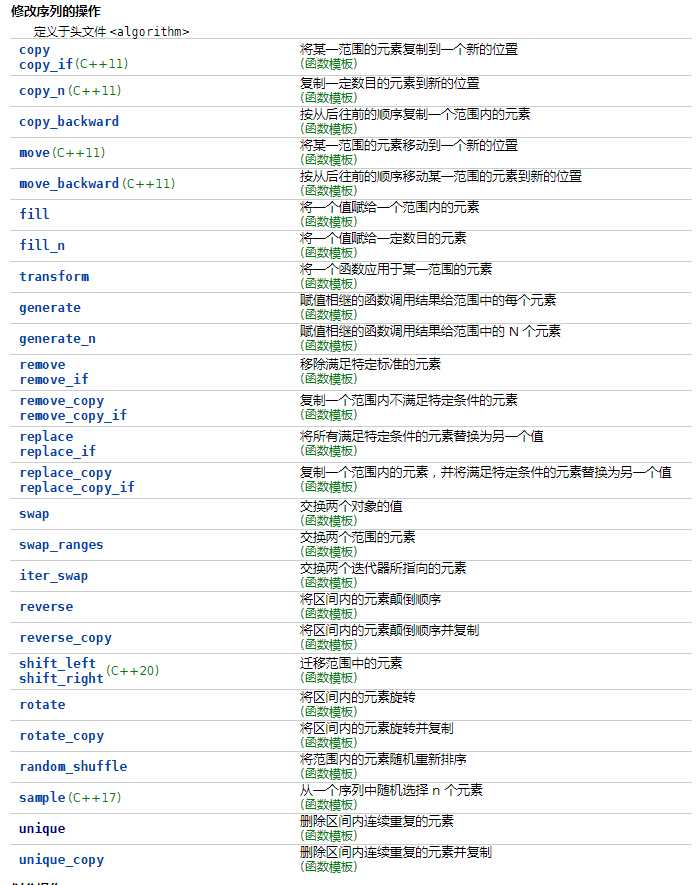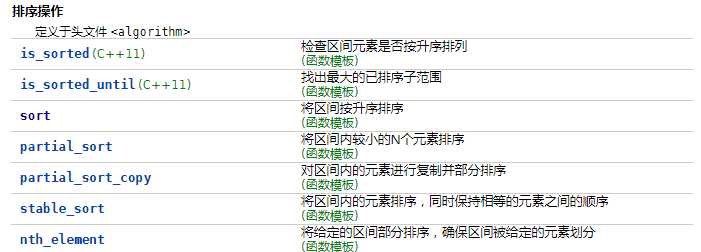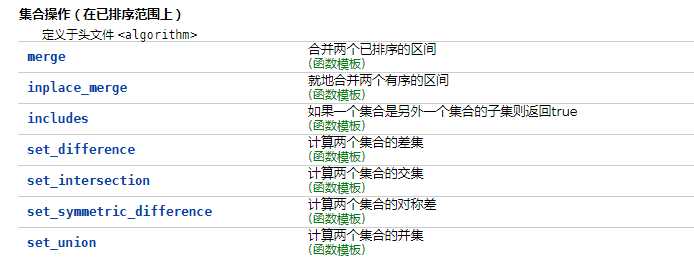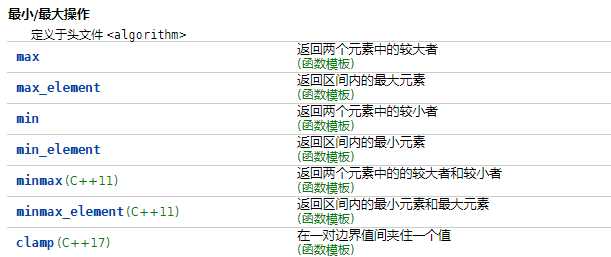标签:分享 col 判断 集合 分享图片 alt tps inf get
std中定义了很好几种顺序容器,它们自身也提供了一些操作,但是还有很多算法,容器本身没有提供。 而在algorithm头文件中,提供了许多算法,适用了大多数顺序容器。与c++11相比,很多函数在 c++17与c++20又改变了很多,下面内容基于c++11去简单介绍.
参考文献: https://en.cppreference.com或 https://zh.cppreference.com, 大家直接去这里看吧。。我就是拿的这里的!!!
介绍之前,首先说明两点:
a. 判断给定的容器是否满足给定条件
all_of(iter1_, iter2_, unaryPredicate_) // 返回bool类型,如果容器内的所有元素, 对一元谓词为true,则返回true;
any_of(iter1_, iter2_, unaryPredicate_) // 返回bool类型,如果容器任何一个元素, 对一元谓词为true,则返回true;
none_of(iter1_, iter2_, unaryPredicate_) // 返回bool类型,如果容器内没有一个元素,对一元谓词为true,则返回true; (与all_of()正好相反)
b. 查找容器中满足条件的元素(如果不给定谓词参数,则会使用opretor==)
find(iter1_,iter2_, value) // 返回迭代器,它指向第一个等于value的元素。
find_if(iter1_,iter2_, unary_predicate_) // 返回迭代器,它指向第一个使一元谓词为true的元素。
find_if_not(iter1_, iter2_, unary_predicate_) // 返回迭代器,它指向第一个使一元谓词为false的元素。
find_first_of(iter1, iter2, iter11, iter22, binaryPredicate_) // 返回迭代器, 在[iter1,iter2)中查找在[iter11,iter22)出现的任意一个元素, 返回第一个满足条件的元素的迭代器。
find_end(iter1, iter2, iter11, iter22, binaryPredicate_) // 返回迭代器, 在 [iter1, iter2)中查找子序列[iter11, iter22), 返回满足条件的最后一个序列的起始元素。
fadjacent_find(iter1, iter2, binarayPredicate_) // 返回迭代器, 在[iter1, iter2)中查找相邻的元素满足条件的;
c. 查找容器中满足条件元素的数目
cout(iter1, iter2, value) // 返回满足条件的数目
cout_if(iter1, iter2, unaryPredidate_) // 返回使一元谓词为true的数目
d. 对容器内的每一个元素执行相同的操作
for_each(iter1_, iter2_, unaryFunction_) // 返回unaryFunction_, 该返回值对一般的函数或函数指针用处不大,对函数对象可能会有用;
// 作用:对指定范围内的所有元素依次执行一元函数操作.
for_each_n(iter1, n, unaryFunction_) // 返回迭代器,指向n个元素的下一个元素, 功能类似.(在c++17中开始有)
从这里到最后的截图图片来自:https://zh.cppreference.com/w/cpp/algorithm, 发现这样有现成的,真的赖得写了啊。





另外,还有一些操作,不经常用,大家去推荐的网站看吧。
标签:分享 col 判断 集合 分享图片 alt tps inf get
原文地址:https://www.cnblogs.com/yinheyi/p/9924710.html